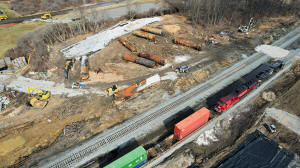NTSB says Norfolk Southern threatened agency during derailment probe
 Send a link to a friend
Send a link to a friend
 [June 26, 2024]
By David Shepardson [June 26, 2024]
By David Shepardson
WASHINGTON (Reuters) -The chair of the National Transportation Safety
Board said Norfolk Southern threatened the board, sought to manufacture
evidence and failed to provide documents during its investigation of a
2023 Ohio derailment.
NTSB Chair Jennifer Homendy said in extraordinary remarks the rail
carrier "delayed or failed to provide critical investigative information
to our team," prompting her to warn it twice the agency would issue
subpoenas to compel disclosure. She described the company's actions as
"unconscionable" and "reprehensible."
The NTSB also found on Tuesday that Norfolk Southern and its contractors
did not need to vent and burn hazardous materials from tank cars after a
February 2023 train derailment in East Palestine, Ohio that it said was
caused by a defective wheel bearing.
The derailment forced residents to temporarily abandon their homes after
the train caught fire and released over 1 million gallons of hazardous
materials and pollutants near the state's border with Pennsylvania.
Norfolk Southern said in a statement that it had cooperated "fully and
ethically" with the NTSB investigation at all times, with full
transparency.
"Our communications with NTSB staff and Board Members were always
motivated by a desire to ensure they had all the relevant information
for their independent evaluation and by a shared commitment to advance
rail safety," the company said.
Last month, Norfolk Southern agreed to pay a $15 million civil penalty
and $57.1 million in past government cleanup costs, as well as millions
in future costs to resolve a U.S. government lawsuit.
Homendy listed a series of actions during the investigation by the
railroad she called unethical or inappropriate, including Norfolk
Southern retaining a private company to conduct testing of off-the-shelf
vinyl chloride for inclusion in the NTSB record.

Parties "are not permitted to manufacture their own evidence and develop
their own set of facts outside of the NTSB investigative process, which
is exactly what Norfolk Southern did," Homendy said.
She said during NTSB meetings this month, a senior Norfolk Southern
executive urged the NTSB to "put to rest the 'rumor' that Norfolk
Southern made the decision to vent and burn to move trains," calling the
railroad's request "unethical and inappropriate."
She added "the entire exchange ended with what everyone from the NTSB
heard in the room was a threat and it was delivered that way." She also
said the railroad had invited the five board members to visit on Monday
- the day before the meeting - and that would "have constituted a
violation of our ethics standards."
'DISREGARDED EVIDENCE'
The NTSB said a key decision by Norfolk Southern and its contractors to
seek approval from the unified incident commander to vent and burn
hazardous materials from five tank cars was unnecessary after they
"misinterpreted and disregarded evidence" and an alternative option to
allow the cars to cool was overlooked.
[to top of second column]
|

General view of the site of the derailment of a train carrying
hazardous waste, in East Palestine, Ohio, U.S., March 2, 2023.
REUTERS/Alan Freed/File Photo

The NTSB staff also said Norfolk Southern and its contractors
withheld "complete and accurate expert opinions and information."
Norfolk Southern said the company and its contractors' "only
motivation in recommending the vent and burn to the Unified Command
was the health and safety of the community and first responders,"
adding the decision was to "protect the community from a potential
catastrophic explosion."
The company said the NTSB mischaracterized the basis of the
recommendation and rejected the contention it withheld views from
the incident commander. Last week, the railroad said it would
convene a vent and burn workgroup to assess current practices and
existing protocols.
NTSB recommended the Federal Railroad Administration set new safety
regulations for inspections and maintenance of heat bearing
detectors, also called box detectors or wayside detectors. The
devices identify potential train safety issues by measuring
temperature as they pass.
The NTSB also wants U.S. Department of Transportation to establish a
replacement schedule to stop the use of tank cars like some in the
Ohio derailment and replace them with newer, safer tank cars with
thicker tank walls and thermal protection.
CONSENT DECREE
Under a proposed consent decree estimated to be worth more than $310
million, the railroad also agreed to significant safety improvements
and training, which includes installing additional devices to detect
overheated wheel bearings early enough to prevent derailments.
Norfolk Southern said under the agreement it will spend $244 million
on safety initiatives through 2025.
The incident sparked public outrage and calls for railroad safety
reforms in Congress but legislation has stalled. Some lawmakers had
said they wanted to wait for the NTSB's report before acting on
safety changes.
Norfolk Southern, which did not admit wrongdoing, said last month
that the deal means the company will face no criminal penalties and
the settlement is included in the around $1.7 billion in related
charges to date for the incident.
In April, Norfolk Southern agreed to pay $600 million to settle a
class action lawsuit over the derailment. The settlement covers
personal injury claims from residents and businesses in the city and
impacted surrounding communities.
(Reporting by David Shepardson; Editing by Nick Zieminski, Aurora
Ellis and Jamie Freed)
[© 2024 Thomson Reuters. All rights reserved.]This material
may not be published, broadcast, rewritten or redistributed.
Thompson Reuters is solely responsible for this content.
 |